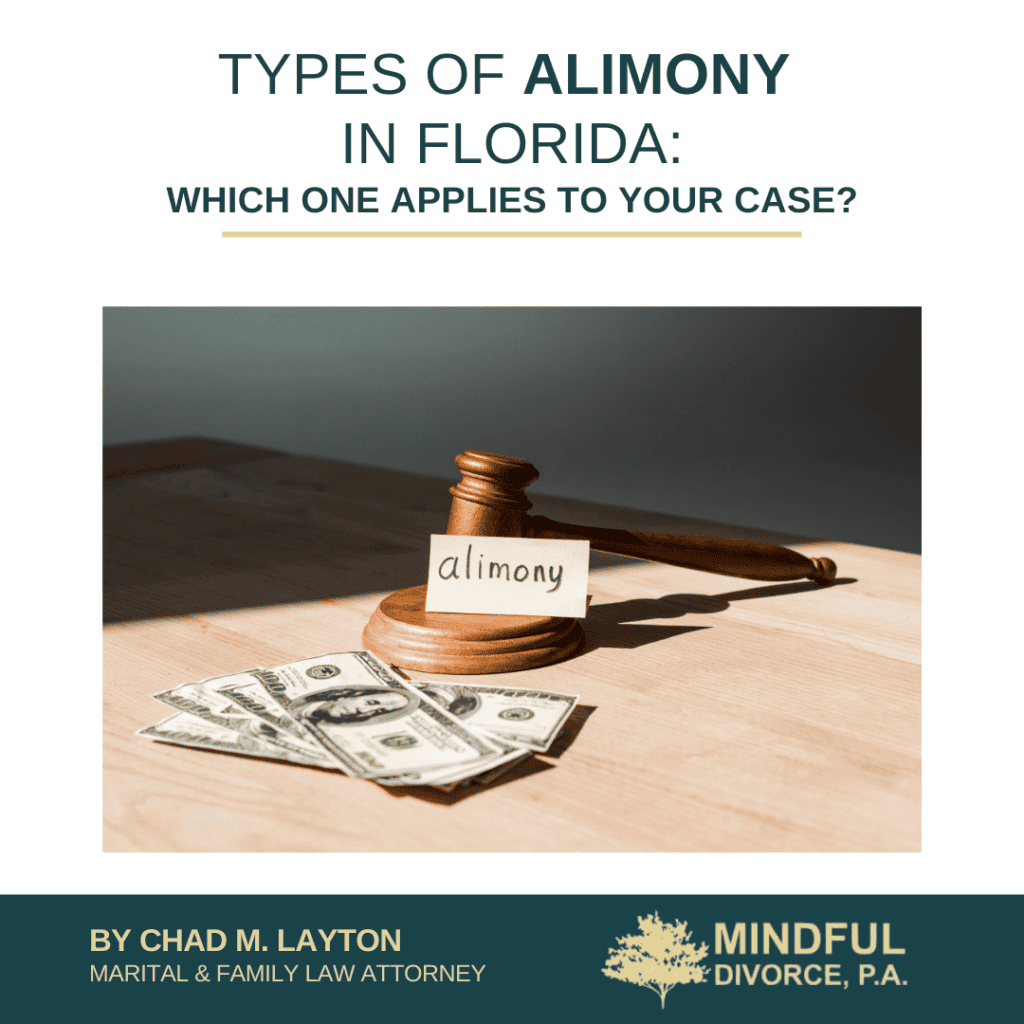
Divorce is stressful, and alimony can add another layer of uncertainty. Whether you’re seeking financial support or facing the possibility of paying, understanding Florida’s alimony laws can help you prepare.
At Mindful Divorce, P.A., we provide clear guidance and fixed-fee services to help you through this process with less stress. Our team has extensive experience in Florida family law and is committed to helping clients find fair resolutions.
In this article, we’ll break down the different types of alimony in Florida, how they work, and what factors might affect your case.
Types of Alimony in Florida
Florida law recognizes several types of alimony, each designed for different situations. The type awarded depends on the length of the marriage, financial circumstances, and other key factors.
Temporary Alimony
Temporary alimony provides financial support while a divorce is in progress, helping maintain the status quo until a final settlement is reached. It ensures that both spouses can manage their expenses and prevent financial hardship during litigation.
This support automatically ends when the divorce is finalized. The court considers factors such as the receiving spouse’s immediate financial needs and the paying spouse’s ability to provide support.
Income, expenses, and existing obligations all play a role in determining the amount awarded. Temporary alimony helps stabilize finances until a permanent arrangement is decided.
Bridge-the-Gap Alimony
Bridge-the-gap alimony provides short-term financial support to help a spouse transition from married to single life.
It covers immediate needs, such as living expenses or financial assistance while waiting for asset distribution.
This type of alimony cannot exceed two years and cannot be modified once awarded. Because of this, careful financial planning is essential. Once the court determines the amount and duration, it remains fixed regardless of changes in circumstances.
Bridge-the-gap alimony is designed to provide temporary relief rather than long-term support, making it crucial for the receiving spouse to plan for financial independence.
Rehabilitative Alimony
Rehabilitative alimony helps a spouse gain the education, training, or work experience needed to become financially independent. This type of support is intended to assist in developing skills or re-entering the workforce after divorce.
A specific rehabilitative plan must be presented to the court, detailing the required education or training, costs, and estimated completion time. The duration of alimony is directly tied to this plan.
The recipient must follow the plan as approved, and failure to do so could result in the modification or termination of payments. Proof of progress may be required to continue receiving support.
Durational Alimony
Durational alimony provides financial support for a set period after divorce, typically awarded in short- or moderate-term marriages when other types of alimony don’t apply. It offers a financial safety net but comes with a clear end date.
The length of durational alimony cannot exceed the length of the marriage and is directly tied to how long the couple was married.
The court considers factors such as the marriage’s duration, each spouse’s financial resources, and their age and health.
Since this support is temporary, it helps the receiving spouse adjust financially while planning for long-term stability.
Factors Considered By Courts When Determining Alimony
When deciding whether to award alimony—and how much—the court looks at several factors:
Ability to Pay vs. Need for Support
The judge will balance one spouse’s need for financial assistance with the other spouse’s ability to provide it. If the paying spouse cannot afford alimony, the request may be denied.
Standard of Living During the Marriage
If one spouse was financially dependent and accustomed to a certain lifestyle, the court may award alimony to help them maintain a similar standard of living after divorce.
Length of the Marriage
The length of time a couple was married plays a big role in determining the type and duration of alimony:
- Short-term: Less than 10 years
- Moderate-term: 10 to 20 years
- Long-term: 20 years or more
Longer marriages often result in longer alimony payments, especially if one spouse stayed home to raise children or support the other’s career.
Age and Health of Each Spouse
If a spouse has health issues that limit their ability to work, the court may award longer-term alimony.
Financial Resources
The court examines both spouses’ incomes, assets, and job prospects. If one spouse sacrificed career opportunities for the marriage, they might be entitled to support.
Contributions to the Marriage
This includes financial support, homemaking, raising children, and supporting the other spouse’s career or education.
Marital Misconduct
In Florida, bad behavior (like cheating) usually doesn’t impact alimony, but financial misconduct—such as wasting marital assets—might.
Can Alimony Be Modified or Terminated?
Yes. In some cases, alimony can be changed after a divorce is finalized. The paying spouse can request a modification if:
- They experience a significant and unexpected financial change (such as job loss or medical issues).
- The recipient fails to follow a rehabilitative plan (if rehabilitative alimony was awarded).
- The recipient remarries or enters a supportive relationship that reduces their financial need.
To request a change, a formal petition must be filed with the court.
How Does Cohabitation Affect Alimony?
If the receiving spouse moves in with a new partner, alimony may be reduced or terminated. Florida courts consider whether the new relationship:
- Involves sharing a residence for an extended period
- Shows signs of financial interdependence, such as shared bills or bank accounts
The paying spouse must present evidence of the supportive relationship to the court before payments can be modified.
Need Alimony Guidance in Florida? Contact Mindful Divorce, P.A.
If you’re going through a divorce in Palm Beach County and have questions about alimony, don’t face this process alone. Understanding your rights and financial future is essential, and having the right legal guidance can make all the difference.
At Mindful Divorce, P.A., we provide clear, fixed-fee legal services so you know the cost upfront—no hidden fees or surprises. Our team is committed to helping you achieve a fair resolution with less stress.
Call us today at 561-537-8227 to schedule a consultation. Let’s work together to find the right solution for your future.



